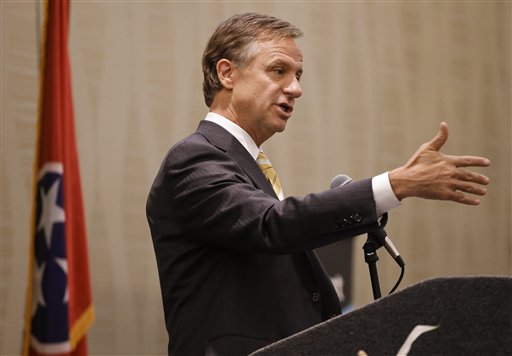NASHVILLE - Tennessee won't participate in a partnership with the federal government in establishing a health insurance exchange, Gov. Bill Haslam announced Friday.
The Republican governor said in a letter to U.S. Health and Human Resources Secretary Kathleen Sebelius that the partnership model doesn't address his concerns over what he called "aggressive federal timelines, a lack of true flexibility for states, and misguided federal policies."
Exchanges are online markets required under President Barack Obama's health care law where consumers will be able to buy individual private policies and apply for government subsidies to help pay their premiums.
Haslam noted that he had the same complaints when he rejected a state-based exchange in December. His deadline decision means Tennesseans will participate in an exchange completely run by the federal government.
About 982,000 people lack health insurance in Tennessee. The state projects that about 300,000 people will participate in the exchange, through some estimates put that number as high as 600,000.
Gordon Bonnyman, executive director of the Tennessee Justice Center, a group that supports greater access to Medicaid, said the governor's rationale for rejecting the partnership was understandable.
"The governor is not alone in expressing concern about the delays in federal guidance and some of the difficulties states are having meeting the timelines," he said.
Haslam's decision on the exchange is independent of whether he will recommend that the state pursue an expansion of Medicaid - a choice the U.S. Supreme Court has left to the states, though the federal government will pick up most of the cost.
Haslam said last week that he's "seen some growing flexibility" in which services the state would have to cover among the expanded Medicaid population. Hospitals and business groups are pushing for an expansion, but a positive recommendation would likely meet heavy resistance in the Republican-controlled Legislature.
Expanding Medicaid eligibility to 138 percent of poverty could add an estimated 145,000 people to the rolls of TennCare, the state's expanded Medicaid program.
The federal government would pay for all of the increased costs under the expansion for the first three years, phasing down its share to 90 percent after that, which is still well above the average 60 percent share it currently covers for Medicaid.
"A lot is at stake for working families, for rural communities and for Tennessee businesses," Bonnyman said. "The governor and legislators are carefully studying those factors and will make a decision that isn't influenced one way or the other by today's announcement."
Even if the state declines to expand Medicaid, officials project an influx of people who are eligible for coverage but hadn't previously signed up. About 46,700 people are expected to join TennCare in 2014, at a cost of $56 million.
While Republican governors were once mostly unified in their opposition to expanding Medicaid under the health care law, six Republican governors have now proposed to accept federal dollars to expand the program to cover more low-income residents, citing the financial realities of their states' medical costs.

